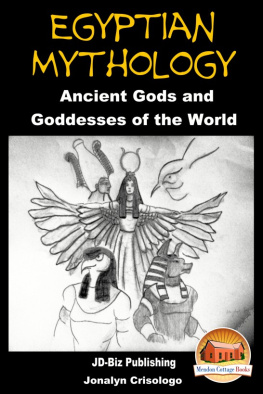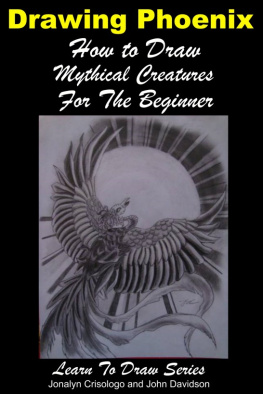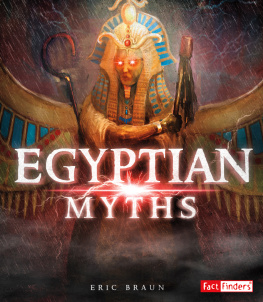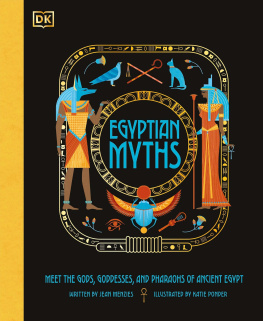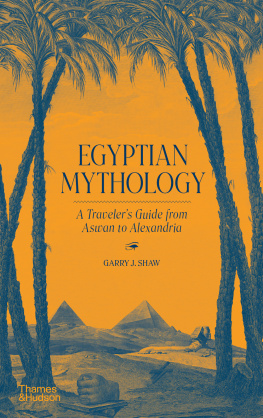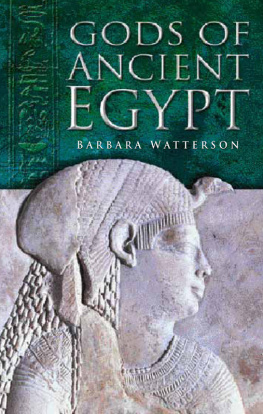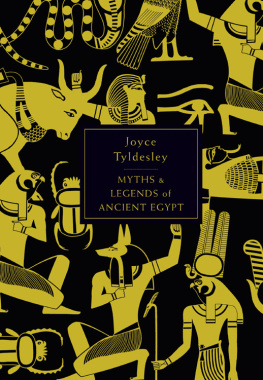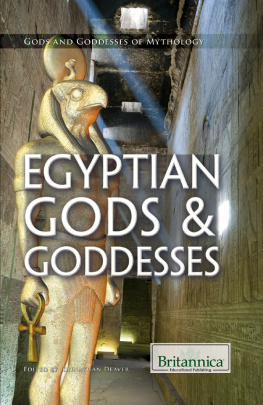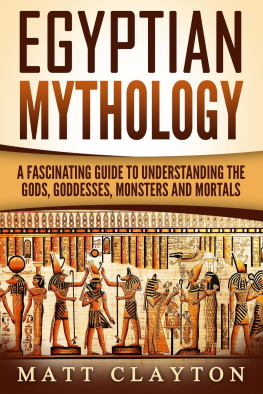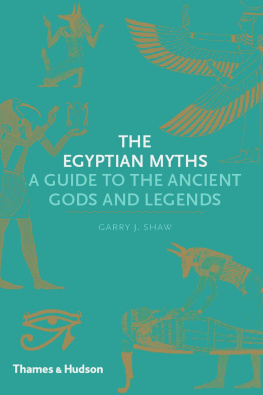Egyptian Mythology
Ancient Gods and Goddesses of the World
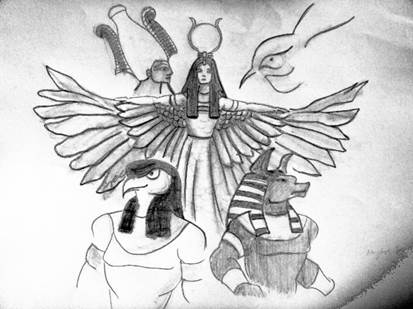
Jonalyn Crisologo
~~~
Smashwords Edition
Mendon Cottage Books

JD-Biz Publishing
All Rights Reserved.
No part of this publication may be reproducedin any form or by any means, including scanning, photocopying, orotherwise without prior written permission from JD-Biz Corp
Copyright 2014. All Images by Darla Nobleor Licensed by Fotolia and 123RF.
Smashwords Edition, License Notes
This ebook is licensed for your personalenjoyment only. This ebook may not be re-sold or given away toother people. If you would like to share this book with anotherperson, please purchase an additional copy for each recipient. Ifyoure reading this book and did not purchase it, or it was notpurchased for your use only, then please return to your favoriteebook retailer and purchase your own copy. Thank you for respectingthe hard work of this author.
Table of Contents
Introduction
Ancient Egypt is one of the most prominentcivilizations in history. The ancient pyramids alone havecaptivated scientists, historians, and globetrotters for centuries.This country developed one of the most advanced civilizations thathave passed on a rich trove of marvelous works and invaluableknowledge to succeeding generations. Exceedingly bountiful indeed,that to this day, much of the pyramids remain subject for furtherscientific exploration.
For the inquisitive mind, it is worth takingnote that Egypt also appears in the Bible. Perhaps the mostwell-known passages are those within the stories of Jacob andMoses. However, the tie that binds the two nations and major worldreligions, reaches as far back as to Abraham.
The Islam Prophet Ishmael was the first-bornof Abraham, to Hagar. Sarah, Abrahams first wife, could not bearchildren and offered her Egyptian servant to him.
Under guidance, Hagar and Ishmael were freed.On their journey through the desert, the two ran out of water andwere close to death. Genesis 21:16-19, New King James Versionnarrates:
16 Then she went and sat down across fromhim at a distance of about a bowshot; for she said to herself, Letme not see the death of the boy. So she sat opposite him, andlifted her voice and wept.
17 And God heard the voice of the lad. Thenthe angel of God called to Hagar out of heaven, and said to her,What ails you, Hagar? Fear not, for God has heard the voice of thelad where he is. 18 Arise, lift up the lad and hold him with yourhand, for I will make him a great nation.
19 Then God opened her eyes, and she saw awell of water. And she went and filled the skin with water, andgave the lad a drink.
Similarly, Ishmael is mentioned several timesin the Quran. He is venerated as a prophet and patriarch and he wasthe ancestor of principal tribes. This is very similar to what isknown as the 12 great Jewish tribes, who were descendants ofAbraham. Most importantly, Ishmael is the forefather of Muhammad,who founded the Islam faith and unified Arabia into a singlereligious polity.
Yeshua bin Yusuf is also said to havetraveled to certain places, such as Egypt, Tibet, and Europe aspart of his study and mission. Spiritual, Gnostic, and New Agewriters have written about his travels, to uncover and publish tothe public, knowledge about the lost years of Jesus. Thelost years in question refer to what occurred in his life fromthe age of 13 to 30, of which little is written about in the Bible.Moreover, Yeshua did not only visit these countries prior topriesthood, but also after his death after resurrection! Thisdisputes the generally accepted notion of his immediate ascensionto heaven.
One of the most controversial and highlydebated works is Christ in Egypt: The Horus-Jesus Connectionby D. M. Murdock. Edgar Cayce, as well as, Stifyn Emrys havewritten about Yeshuas works and travels.
It is worth taking note that Gnostics and NewAge practitioners did not only write about Yeshua, but alsostrongly believed in him, his life, and his missionary works,although, many misconstrue them as atheists (non-believers ofdeities or of a supreme being/God.)
The term Gnostic, per se, is ambiguous.Gnostics are often referred to as agnostics, though the wholecontext needs to be taken into account. It could refer either to agnostic, who adhere to esoteric mystical knowledge, or to anagnostic, who deduce that the conception of the universe or theexistence of God are unknowable. Furthermore, the latter neitherrejects nor accepts the concept of God (or deities) as true.
Among earlier records, Buddhist manuscriptsreveal Yeshuas activities in Tibet and nearby regions. TheEssenes, who authored the Dead Sea Scrolls, have recorded hismissionary works beyond Israel. He also appears in later parts ofthe British Arthurian legends.
However, Yeshuas most famous journeys wereof those in Egypt.
Now, why is Yeshua called Yeshua? Yeshua binYusuf literally translates as Jesus, son of Joseph (his biologicalfather). There are numerous titles and translations given to him inthe Aramaic, Hebrew Scriptures alone, and as the years passed,other designations came about based on the language of the authorsof the records. For instance, the English name Jesus originatedfrom the Greek translation Iesus. In spite of the variations, theyall mean one and the same. The English Jesus Christ is atranslation of the Yeshua Hamashiach. Yeshua means savioror deliverer. In the Annunciation, Archangel Gabriel instructedMary:
Do not be afraid, Mary; you have foundfavor with God. 31 You will conceive and give birth to a son, andyou are to call him Jesus. (Luke 1:26-38, New InternationalVersion)
Hamashiach is the Hebrew translation for TheMessiah. Other titles translate as The Anointed One or The Sonof God.
However, let us not attempt to put togetherthe Islamic and Judeo pedigree, and reconcile issues between thesenations. It is much older than we are, and, perhaps, we are muchwiser to veer our attention elsewhere.
Historically, monotheism did not appear untilthe 14th century BC. Atenism is identified with theAmenhotep IV (also known as Akhenaten) and it is also referred toas the Amarna heresy because of the prohibition of polytheism.Aten, the sun god, became the sole deity under the state religionand, moreover, the worship of idols and images, including that ofAtenwith the exemption of the rayed solar disc. Despite themonotheistic concept, it is interesting to note that each ray ofthe solar disc ended in hands as a representation of Atens unseenspirit.
However, Atenism only lasted for two decades.The succeeding monarchs resurrected the ancient gods, andobliterated all records of Atenism and its pharaohs.
Egyptian Mythology: The Gods and Goddessesof the World will explore the major deities of the AncientWorld, of which the origins of their saga remain difficult totrace. Moreover, there are over 200 gods that have been accountedfor! Nevertheless, the Great Pyramids have withstood the centuries,keeping their stories very much alive and intact for archaeologicalexcavation and scrutiny. And here, we narrow down the mostprominent.
Some scholars say that the Egyptians weremerely keen observers of their environment. They were intelligentand highly advanced in terms of technology and to this day, nomodern equipment can possibly duplicate the Great Pyramids. Thus,developing a complex structure of beliefs and traditions would havebeen natural for them.

